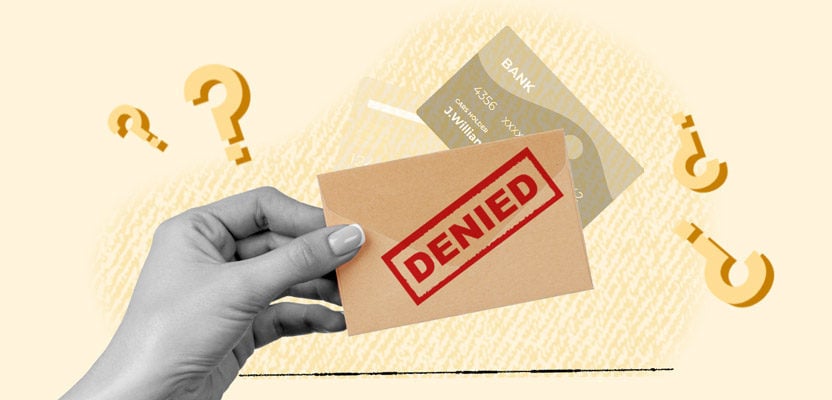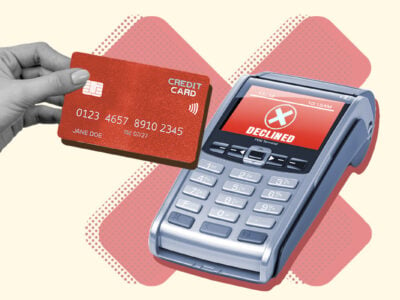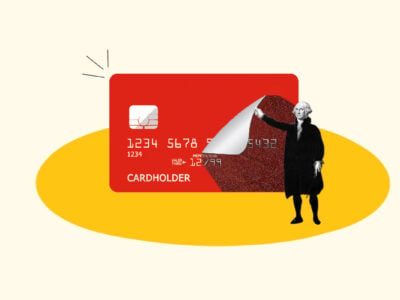It’s frustrating to apply for a credit card and get denied, especially because repeated applications can lower your credit score. When card issuers reject you, they’re required to explain their reasons, but receiving this information after the fact can be more frustrating than useful. 1
Before you apply, it’s important to know what credit card issuers are looking for—both the red flags that could get you rejected and the steps you can take to recover from them.
Table of Contents
- 1. You have a low credit score
- 2. You have a high debt-to-income ratio
- 3. You already have too many credit cards
- 4. You’re using too much of your available credit
- 5. You have too many recent hard inquiries
- 6. You have a limited credit history
- 7. You’ve made too many late payments
- 8. You have recent collection accounts
- 9. Information missing from the application
1. You have a low credit score
It’s very common for creditors to reject applicants who have bad credit scores. This is because they see those applicants as higher-risk and don’t want to take the chance that they’ll default on their bills.
Before you apply for a new credit card, check your credit score. If it’s below the average preferred credit score for the type of card you’re applying for, then don’t submit your application—the card issuer will probably reject you.
For example, if you have a credit score of 620 or below, you’ll have a hard time getting a high-end rewards credit card, and if your score is below 580 you may have a hard time getting a credit card at all (with the possible exception of ones with very high interest rates).
Solution: Consider a secured credit card
Unlike traditional unsecured credit cards, secured credit cards are easier to get and involve less risk for you and your creditor. To get a secured credit card, you need to put down a cash deposit. It will serve as your credit limit and as collateral that your creditor can seize if you stop making payments.
Secured credit cards are designed for subprime borrowers (people with bad credit scores) and individuals with insufficient credit histories. Because your card issuer will report your account information to the credit reporting agencies, secured credit cards can help you improve your credit score, which will help you qualify for a better card in the future.
2. You have a high debt-to-income ratio
Creditors need to make sure that you’ll be able to repay your debts, so they’ll usually evaluate your financial situation when you apply for a card. 2 They’ll often do this by looking at your debt-to-income ratio (DTI), which is a percentage representing how much of your income goes toward paying off debts.
The Consumer Financial Protection Bureau recommends maintaining a DTI ratio of 15%–20% or below (if you have no mortgage) or 36% (if you have one). 3
If your credit card application was rejected or you were offered a card with a lower credit limit, it could be because the card issuer thinks that your DTI is too high and you might not have enough disposable income to afford your payments.
Solution: Pay down your debts before applying for a credit card
To pay down your debts, adjust your lifestyle so that you can make higher payments on your credit accounts each month. Take a look at where your money is going to see if there are any areas where you can cut down your spending. For example, you could:
- Eat out less
- Cancel unnecessary subscriptions
- Postpone your next vacation
- Take public transportation instead of driving
- Get a roommate or move in with a family member
You can also look for ways to increase your income, like taking on extra work or asking your boss for a raise. If this isn’t feasible, focus on budgeting to get out of debt.
3. You already have too many credit cards
If your application was denied because you have too many credit cards, the credit card issuer might be wondering why you would apply for another card when you already have so many.
There’s no universal maximum number of credit cards that creditors want to see. In fact, having multiple credit card accounts in good standing can demonstrate your reliability as a borrower—top FICO scorers have a mix of seven open and closed credit card accounts. 4
However, if you’ve recently opened multiple accounts, it can look suspicious to creditors and suggest that you’re financially unstable.
Solution: Wait a while before applying for new cards
You might think that the obvious solution is to close down credit card accounts that you don’t need. However, doing so can actually hurt your credit score by lowering your available credit. You should avoid closing any accounts unless you absolutely need to (e.g., they have annual fees that you can’t afford).
If you have credit cards that you opened relatively recently, try waiting a year or two and then apply again. This will give you time to build up a positive payment history and demonstrate that you can manage multiple accounts.
4. You’re using too much of your available credit
Your credit utilization rate (also known as your debt-to-credit ratio) is the amount you owe to creditors versus the amount of available credit you have.
This is one of the most important factors considered in the calculation of your credit score. A high credit utilization rate may indicate that you’re financially unstable or unable to control your spending. This is a red flag for credit card issuers and may cause them to deny your application.
Solution: Use less of your available credit
Figure out what your credit utilization rate is for each individual credit card and then for all of your credit cards put together. Next, find ways to reduce this number so that it’s below 30%, and even lower if you can manage it (VantageScore considers a credit utilization rate under 10% to be ideal). 5
If using less credit isn’t a realistic option, you can ask your creditors to increase your credit limits or try to pay your credit card bills promptly each month, before they’re reported to the credit bureaus. Both of these will also decrease your credit utilization.
5. You have too many recent hard inquiries
Applying for a new credit account usually triggers a hard inquiry, which will stay on your credit report for two years and temporarily take a few points off of your credit score. 6
Theoretically, if you apply for too many credit cards within a short period of time, you could damage your credit enough to put you into a lower credit score tier. As a consequence, your issuer might require you to pay a higher interest rate than they normally would or reject your application outright.
But why? Similar to having too many credit cards, having too many hard inquiries can raise questions about why you’re looking for credit and indicate that you’re in financial distress.
Alternatively, you can apply for a credit card that offers approval without a credit check (aka no hard inquiry). However, only credit cards for lower credit scores have this feature, so fair-to-good credit holders shouldn’t consider this option.
Solution: Don’t apply for too many credit accounts at once
To avoid incurring too many hard inquiries, only apply for new credit when you really need it.
You should also try to only apply for credit cards that you think you’ll actually qualify for so that you’ll get approved on your first try, minimizing the number of credit checks you have to undergo.
6. You have a limited credit history
The length of your credit history is a major factor contributing to your credit score, so your application might be denied if you haven’t been using credit for very long. Credit card companies usually want to work with people who have experience managing different types of credit accounts and keeping on top of their debt.
Solution: Build your credit before applying for a credit card
Before submitting your first credit card application, explore the various ways you can build credit. Here are a couple of quick ways to strengthen your credit history:
- Become an authorized user on someone else’s credit account.
- Use a bill-reporting service like Experian Boost or a rent-reporting service to add your regular payments to your credit report.
Alternatively, you can apply for a credit-builder loan or a specialty credit card that’s specifically designed to help you work on your credit score. These are long-term approaches that won’t boost your credit overnight. However, they can significantly improve your score in the long run.
We’ve listed a few credit cards that are designed for building credit below:
7. You’ve made too many late payments
A card issuer might reject your credit card application if your credit report shows a history of late payments, particularly recent ones. This is a red flag to lenders and indicates that you might miss more payments in the future. 8
Solution: Resolve your current debts and try to delete the late payments
You may be able to set your lender’s mind at ease by paying off all of your current debts. This communicates that although you struggled in the past, you’ve since taken control of your finances.
If your debts are too large to pay off, reach out to a nonprofit credit counseling agency. They can help you set up a debt management plan with more manageable payments.
Once you’ve cleared your debts with the creditor whose payment you missed, you can send them a goodwill letter asking them to remove the negative mark from your credit report. This is more likely to work if the late payment was due to circumstances beyond your control, such as a sudden layoff that threw your finances into disarray.
You can create your letter with our downloadable goodwill letter template.
8. You have recent collection accounts
If your credit card application was denied due to recent collection activity, it means that a creditor or another organization (e.g., a utility company or hospital) has charged off your debt and sent it to a debt collection agency. In turn, the collection agency has reported your past-due debt to the credit bureaus.
A collection account on your credit report is a sign of financial instability and a demonstration that you don’t always honor your agreements with creditors.
Solution: Deal with your debts in collection
If you have a debt in collection, do the following:
- Send a debt verification letter: Not all debts are legitimate. Before you decide to pay, send your debt collector a verification letter. This obligates them to provide evidence that you really owe the debt. If they can’t, they have to cease their collection efforts and remove the negative mark from your credit report.
- Negotiate pay for delete: If it turns out that you do owe the debt, you can send a letter to the debt collector offering to pay off the debt in exchange for having the collection account removed from your credit report. To create this letter, use our free pay for delete letter template.
Even if the collector rejects your pay-for-delete negotiation, you should strongly consider paying off your debts in collection (assuming they’re legitimate). Lenders look on paid collection accounts more favorably than unpaid ones, and some newer credit scoring models (such as FICO 9) actually ignore them outright, which means that paying them off will improve your credit score.
9. Information missing from the application
When you don’t fill out all of the required fields on a credit card application, the creditor may not have enough information regarding your income, employment, or identity. This could cause them to automatically reject your application.
Solution: Double-check your application for errors
Review every credit application before you submit it to make sure everything is correct. Answer truthfully and accurately, and be sure to leave no blank spaces on the form. If you’re unsure how to complete a field, research it online or contact the card issuer for more information.
When a card issuer denies your application, they’ll usually keep information on file explaining the reason, so if you’re not sure what happened, try just contacting them. After that, address whatever issues prevented you from being accepted and try again when you’re ready.






